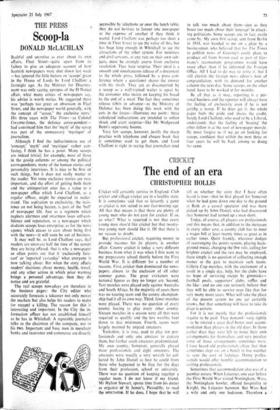Scoop-la
THE PRESS DONALD McLACHLAN
Bashful and secretive as ever about its own affairs, Fleet Street—quite apart from its ' failure to give an adequate account of how' Scottish newspapers were shut down last week —has ignored the little lecture on `scoops' given in the House of Lords by Lord Chalfont a fortnight ago. As the Minister for Disarma- ment was only saying, apropos of the D Notice affair, what many critics of newspapers say, his advice is worth notice. He suggested there was 'perhaps too great an obsession in Fled Street, and the newspaper world generally, with the concept of "scoop," the exclusive story.' His three years with The Times—as Colonel Gwynne-Jones, the defence correspondent— had convinced him that the 'myth' of the scoop was part of the unnecessary 'mystique' of journalism.
Although I find the indiscriminate use of `concept,' myth' and 'mystique' rather con- fusing, I think he has a point. Many scoops are indeed trivial; for example, most of those in the gossip columns or among the political correspondents, many of the human stories and personality interviews. It is nice to be first oh' such things, but it does not really matter to the reader. Yet some exclusive stories are very important, and the effort of getting both them• and the unimportant ones has a value to a newspaper office which Lord Chalfont, as a regular officer, might be expected to under- stand. The aspiration to exclusivity, the insis- tence on not being beaten, is part of the 'bull' of newspaper life. Just as a regiment which neglects alertness and smartness loses self-con- fidence and reputation. so a newspaper which disdains scoops loses enterprise; as for the news' agency which ceases to care about being first with the news—it will soon be out of business.
It may well be, as Lord Chalfont says, that' readers are unaware half the time of the scoops' they are being' offered: that is why a newspaper so often points out that it 'exclusively fore- cast' or 'reported yesterday' what everyone is now talking about. But when the story affects readers' decisions about money, health, travel, and any other action in which prior warning' brings a personal advantage, then they do notice and are grateful.
The real scoops nowadays are therefore in the business pages: the City editor wild accurately forecasts a takeover not only moves the markets but also helps his readers to make (or escape) a killing. The reason for this is interesting and important. In the City the in- formation officer has not established himself as he has in Whitehall. A reputable journalist talks to the chairman of the company, not to' his PRO. Important and busy men in merchant banks and insurance and commerce are directly accessible by telephone or over the lunch table; they 'do not hesitate to favour one newspaper at the expense of another if they think it useful. Lord Chalfont was perhaps too short a time in Fleet S:reet to see the value of this, but has been long enough in Whitehall to see the attractions of the other system. For ministers and civil servants, at any rate on their own sub- jects, must be strongly averse from exclusive revelation. They hate surprise. Their ideal is a smooth and simultaneous release of a document to the whole press, followed by a press con- ference where a questioner shares the answer with his rivals. They are as disconcerted by a scoop as• a well-trained waiter is upset by the customer who insists on keeping his bread to the end of a meal. The fact they sometimes release titbits in advance—as the Ministry of Defence has been doing this week with the cuts in the forces—illustrates my point: these calculated indiscretions are intended to soften shock and avert surprise—like Mr Wedgwood Benn's supersonic booms.
Very few scoops, however, justify the sharp practice with telephone and cheque book that is sometimes used to get them, and Lord Chalfont is right in saying that journalists tend
to talk too much about them—just as they boast too much about their 'courage' in attack- ing politicians. Some scoops are, in fact, easily come by. My own first scoop, sent from Berlin in 1934, was handed to me on a plate by a businessman, who believed that for The Times to publish news of Goering's costly plans to produce oil from brown coal as part of Ger- many's rearmament programme would have more effect than if he informed the Foreign Office. All I had to do was to write it: but I still cherish the foreign news editor's note of congratulation, with its demand for another column the next day. Some scoops, on the other hand, have to be worked at for months.
Be all that as it may, reporting is a per- sonal business and the reporter will always have the feeling of exclusivity even if he is not gettihg a scoop. If he does get it, the whole paper feels the pride and shares the credit. Surely Lord Chalfont, who used to be a Liberal, understands that the feeling of 'beating' the other fellow is at the root of newspaper morale. He must forgive us if we go on looking for scoops, confident that within the next three or four years he will be back among us doing the same.






























 Previous page
Previous page